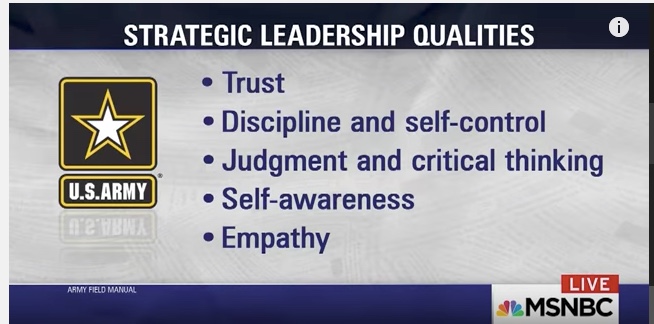What are the essential capacities a leader who shoulders responsibility for the fate of an enterprise and its people must have? Marrying psychoanalysis and the Army’s Field Manual on Leader Development (unlikely but strangely compatible bed-fellows!) I came up with a five item checklist of absolutely fundamental, essential character and cognitive traits and abilities. The tool was originally developed in a political context and was featured in an LA Times Op-Ed and in my guest appearance on The Last Word with Lawrence O’Donnell. But its business applications are very intriguing.
Here’s the checklist:
- Trust (both the ability to trust others and to inspire trust)
- Judgment/Critical Thinking
- Discipline/Self-Control
- Self-Awareness
- Empathy
To me, the exciting potential of this tool is its common sense basis and portability. But don’t confuse its straight forwardness for shallowness. The checklist is founded on a century of research and scholarship in psychoanalysis, psychiatry and psychology and has been field tested by the military.
Anyone whose decisions are going to effect the fate of people and businesses for whom he or she is responsible needs to meet this bar. If lives or fortunes are at stake, these capacities need to be robust. A Board looking at new CEO candidates, a search committee recruiting a University President has a vast amount of data on the people they are considering, and a long list of priorities to meet. But I suggest that every leader candidate under consideration also be subjected to this simple but essential test.
An intuitive gut level judgment is likely the best measure of these vital human capacities. I recommend that when a group is using this tool, each member make their assessment on the five traits independently before the team comes together to compare notes.
The value of simple, straightforward, human judgment comes through in the essays of Warren Buffett.*
He writes, “For our part, we like dealing with owners who care what happens to their companies and people. ” (Emphasis added).
And more from Buffett: “When you have able managers of high character running businesses about which they are passionate, you can have a dozen or more reporting to you and still have time for an afternoon nap. Conversely, if you have even one person reporting to you who is deceitful, inept or uninterested, you will find yourself with more than you can handle…
We [Buffett and Charlie Munger] tend to continue our practice of working only with people we like and admire.”
*The Essays of Warren Buffett: Lessons for Corporate America, Fourth Edition (Lawrence Cunningham)

Leave a Reply